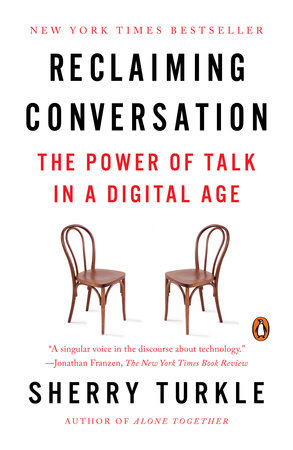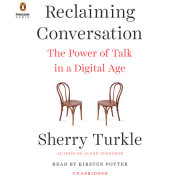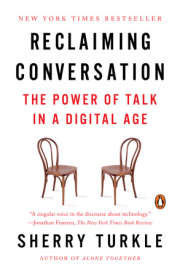The Case for Conversation
The Empathy Diaries
Twelve-year-olds play on the playground like eight-year-olds. . . . They don’t seem able to put themselves in the place of other children. —The dean of the Holbrooke Middle School, commenting on an “empathy gap” among students*
Why a book on conversation? We’re talking all the time. We text and post and chat. We may even begin to feel more at home in the world of our screens. Among family and friends, among colleagues and lovers, we turn to our phones instead of each other. We readily admit we would rather send an electronic message or mail than commit to a face-to-face meeting or a telephone call.
This new mediated life has gotten us into trouble. Face-to-face conversation is the most human—and humanizing—thing we do. Fully present to one another, we learn to listen. It’s where we develop the capacity for empathy. It’s where we experience the joy of being heard, of being understood. And conversation advances self-reflection, the conversations with ourselves that are the cornerstone of early development and continue throughout life.
But these days we find ways around conversation. We hide from each other even as we’re constantly connected to each other. For on our screens, we are tempted to present ourselves as we would like to be. Of course, performance is part of any meeting, anywhere, but online and at our leisure, it is easy to compose, edit, and improve as we revise.
We say we turn to our phones when we’re “bored.” And we often find ourselves bored because we have become accustomed to a constant feed of connection, information, and entertainment. We are forever elsewhere. At class or at church or business meetings, we pay attention to what interests us and then when it doesn’t, we look to our devices to find something that does. There is now a word in the dictionary called “phubbing.” It means maintaining eye contact while texting. My students tell me they do it all the time and that it’s not that hard.
We begin to think of ourselves as a tribe of one, loyal to our own party. We check our messages during a quiet moment or when the pull of the online world simply feels irresistible. Even children text each other rather than talk face-to-face with friends—or, for that matter, rather than daydream, where they can take time alone with their thoughts.
It all adds up to a flight from conversation—at least from conversation that is open-ended and spontaneous, conversation in which we play with ideas, in which we allow ourselves to be fully present and vulnerable. Yet these are the conversations where empathy and intimacy flourish and social action gains strength. These are the conversations in which the creative collaborations of education and business thrive.
But these conversations require time and space, and we say we’re too busy. Distracted at our dinner tables and living rooms, at our business meetings, and on our streets, we find traces of a new “silent spring”—a term Rachel Carson coined when we were ready to see that with technological change had come an assault on our environment. Now, we have arrived at another moment of recognition. This time, technology is implicated in an assault on empathy. We have learned that even a silent phone inhibits conversations that matter. The very sight of a phone on the landscape leaves us feeling less connected to each other, less invested in each other.
Despite the seriousness of our moment, I write with optimism. Once aware, we can begin to rethink our practices. When we do, conversation is there to reclaim. For the failing connections of our digital world, it is the talking cure.
“They Make Acquaintances, but Their Connections Seem Superficial”
In December 2013, I was contacted by the dean of the Holbrooke School, a middle school in upstate New York. I was asked to consult with its faculty about what they saw as a disturbance in their students’ friendship patterns. In her invitation, the dean put it this way: “Students don’t seem to be making friendships as before. They make acquaintances, but their connections seem superficial.”
The case of the superficial acquaintances in middle school was compelling. It was of a piece with what I was hearing in other schools, about older students. And so it was decided that I would join the Holbrooke teachers on a faculty retreat. I brought along a new notebook; after an hour, I wrote on its cover “The Empathy Diaries.”
For that’s what the Holbrooke teachers are thinking about. Children at Holbrooke are not developing empathy in the way that years of teaching suggested they would. Ava Reade, the dean of the school, says that she rarely intervenes in student social arrangements, but recently she had to. A seventh grader tried to exclude a classmate from a school social event. Reade called the remiss seventh grader into her office and asked why it happened. The girl didn’t have much to say:
[The seventh grader] was almost robotic in her response. She said, “I don’t have feelings about this.” She couldn’t read the signals that the other student was hurt.
These kids aren’t cruel. But they are not emotionally developed. Twelve-year-olds play on the playground like eight-year-olds. The way they exclude one another is the way eight-year-olds would play. They don’t seem able to put themselves in the place of other children. They say to other students: “You can’t play with us.”
They are not developing that way of relating where they listen and learn how to look at each other and hear each other. The Holbrooke teachers are enthusiastic users of educational technology. But on their retreat, they follow what some call the precautionary principle: “Indication of harm, not proof of harm, is our call to action.” These teachers believe they see indications of harm. It is a struggle to get children to talk to each other in class, to directly address each other. It is a struggle to get them to meet with faculty. And one teacher observes: “The [students] sit in the dining hall and look at their phones. When they share things together, what they are sharing is what is on their phones.” Is this the new conversation? If so, it is not doing the work of the old conversation. As these teachers see it, the old conversation taught empathy. These students seem to understand each other less.
I was invited to Holbrooke because for many decades I have studied children’s development in technological culture. I began in the late 1970s, when a few schools were experimenting with personal computers in classrooms or special computer laboratories. I work on this question still, when many children come to school with a tablet or laptop of their own, or one their school has issued.
From the beginning, I found that children used the digital world to play with issues of identity. In the late 1970s and early 1980s, children used simple programming as an expressive medium. A thirteen-year-old who had programmed a graphical world of her own said: “When you program a computer, you put a little piece of your mind into the computer’s mind and you come to see yourself differently.” Later, when personal computers became portals to online games, children experimented with identity by building avatars. The particulars changed with new games and new computers, but something essential remained constant: Virtual space is a place to explore the self.
Also constant was the anxiety of adults around children and machines. From the beginning, teachers and parents worried that computers were
too compelling. They watched, unhappy, as children became lost in games and forgot about the people around them, preferring, at long stretches, the worlds in the machine.
One sixteen-year-old describes this refuge: “On computers, if things are unpredictable, it’s in a predictable way.” Programmable worlds can be made exciting, but they also offer new possibilities for a kind of experience that some began to call friction-free. Newton’s laws need not apply. Virtual objects can be made to simply glide along. And you, too, can glide along if that’s how things are programmed. In virtual worlds, you can face challenging encounters—with scoundrels and wizards and spells—that you know for sure will work out in the end. Or you can die and be reborn.
Real people, with their unpredictable ways, can seem difficult to contend with after one has spent a stretch in simulation.
From the early days, I saw that computers offer the illusion of companionship without the demands of friendship and then, as the programs got really good, the illusion of friendship without the demands of intimacy. Because, face-to-face, people ask for things that computers never do. With people, things go best if you pay close attention and know how to put yourself in someone else’s shoes. Real people demand responses to what they are feeling. And not just any response.
Time in simulation gets children ready for more time in simulation. Time with people teaches children how to be in a relationship, beginning with the ability to have a conversation. And this brings me back to the anxieties of the Holbrooke teachers. As the Holbrooke middle schoolers began to spend more time texting, they lost practice in face-to-face talk. That means lost practice in the empathic arts—learning to make eye contact, to listen, and to attend to others. Conversation is on the path toward the experience of intimacy, community, and communion. Reclaiming conversation is a step toward reclaiming our most fundamental human values.
Mobile technology is here to stay, along with all the wonders it brings. Yet it is time for us to consider how it may get in the way of other things we hold dear—and how once we recognize this, we can take action:
We can both redesign technology and change how we bring it into our lives.
Copyright © 2016 by Sherry Turkle. All rights reserved. No part of this excerpt may be reproduced or reprinted without permission in writing from the publisher.







